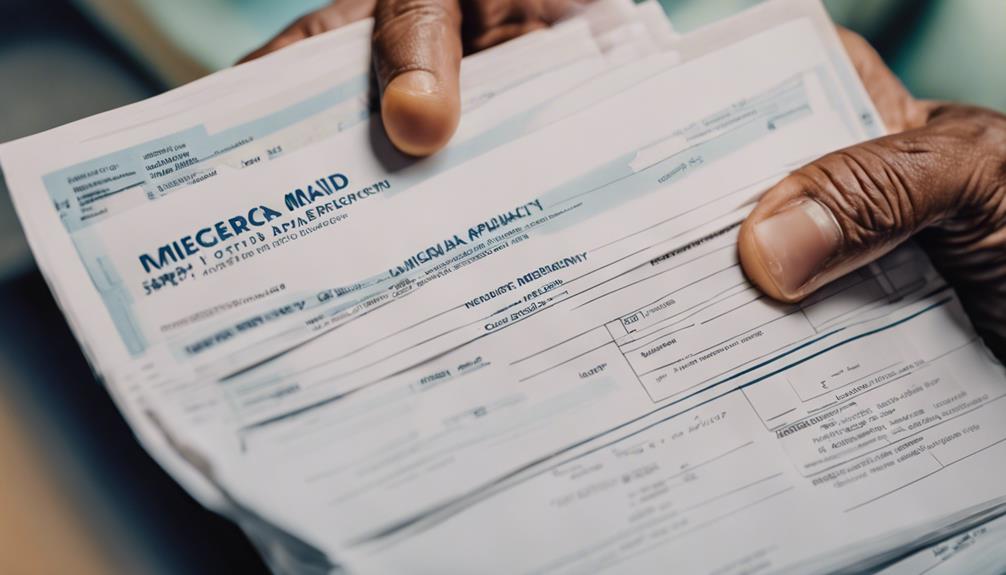To secure Emergency Medicaid in Oklahoma, gather vital documentation. Submit valid proof of identity — like a current driver's license — ensuring it matches your application. Provide income evidence such as pay stubs or tax returns, accurately reflecting your financial standing. Validate residency with utility bills or a lease agreement, confirming your address aligns with your application. Detail the medical emergency, emphasizing urgency and treatment options. Enclose medical reports and insurance details to strengthen your case. Fulfilling these requirements meticulously will aid your eligibility for Emergency Medicaid swiftly.
Proof of Identity
To apply for Emergency Medicaid in Oklahoma, you must provide proof of identity through valid documentation such as a driver's license or passport. Identification verification is crucial in ensuring that the applicant is who they claim to be.
If there have been any name changes due to marriage, divorce, or other reasons, it's essential to include name change documentation like a marriage certificate or court order to link all identities together accurately.
When submitting your application, make sure that the documents provided are current and unexpired. The name on your identification documents should match the name you're using on your Medicaid application. Any discrepancies could lead to delays in processing your application or even rejection.
It's advisable to double-check all the information before submitting to avoid any complications.
Income Verification
When applying for Emergency Medicaid in Oklahoma, ensuring accurate income verification is imperative to determine eligibility for assistance. Income verification is a crucial step in the application process as it helps the Medicaid office assess your financial situation and determine if you meet the eligibility criteria for emergency Medicaid coverage.
To verify your income, you may be required to provide documents such as pay stubs, tax returns, bank statements, or a letter from your employer outlining your earnings. It's essential to ensure that these documents accurately reflect your current financial status to avoid any delays or issues with your application.
The eligibility criteria for Emergency Medicaid in Oklahoma often include income thresholds that applicants must meet to qualify for assistance. By providing the necessary income verification documents promptly and accurately, you can help streamline the application process and increase your chances of receiving the emergency Medicaid coverage you need.
Be diligent in gathering and submitting all required income verification documentation to ensure a smooth application process.
Residency Confirmation
Properly confirming your residency status is a fundamental requirement when applying for Emergency Medicaid in Oklahoma. To establish legal residency, you must provide proof of address within the state. Acceptable documents for proof of address include utility bills, lease agreements, or a driver's license with your current Oklahoma address. It's crucial that the address on these documents matches the one listed on your Emergency Medicaid application to ensure smooth processing.
Legal residency is a key factor in determining eligibility for Emergency Medicaid benefits. The state requires individuals to be legal residents of Oklahoma to qualify for this emergency healthcare assistance. Providing accurate and up-to-date residency documentation will help validate your eligibility and facilitate the application process.
Failure to provide sufficient proof of legal residency may result in delays or denial of your Emergency Medicaid application. Therefore, it's essential to gather and submit the necessary documents confirming your residency status to support your eligibility for this critical healthcare coverage.
Medical Emergency Details
Ensuring prompt and thorough documentation of the medical emergency details is crucial for your Emergency Medicaid application in Oklahoma. When detailing the medical emergency, it's essential to provide information about the treatment options that were considered or administered. Highlighting the treatment options showcases the severity of the situation and the necessity of immediate medical intervention.
Additionally, including details about insurance coverage is vital. Mention whether the individual has any existing insurance and if it covers the emergency medical services. If there's no insurance coverage, explain the reasons for the lack of insurance and how it has impacted the individual's ability to receive timely medical care.
Additional Supporting Documents
To strengthen your Emergency Medicaid application in Oklahoma, it's imperative to gather and submit additional supporting documents that bolster the details of the medical emergency and the individual's financial situation. Medical records play a crucial role in providing evidence of the medical emergency's severity and the necessity of immediate treatment. Including detailed medical reports, diagnosis notes, and treatment plans can significantly strengthen your application.
Additionally, providing documentation of insurance coverage, or lack thereof, is essential for demonstrating the individual's financial need for Emergency Medicaid. Submitting copies of insurance policies, denial letters, or proof of unaffordable premiums can help paint a clear picture of the financial challenges faced by the individual in accessing necessary medical care.
Conclusion
In conclusion, remember to gather your proof of identity, income verification, residency confirmation, and medical emergency details when applying for emergency Medicaid in Oklahoma.
These documents are crucial in ensuring your eligibility for assistance during times of need.
Don't forget any additional supporting documents that may be required to complete your application smoothly and efficiently.
By being prepared and organized, you can navigate the process with ease and receive the help you need without delay.
